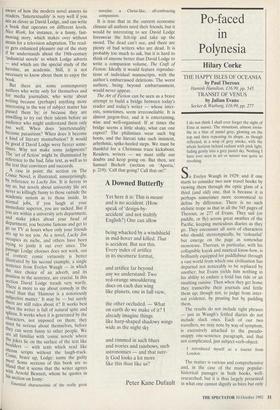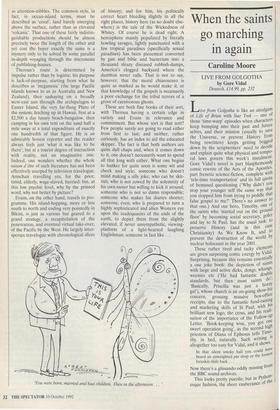Po-faced in Polynesia
Hilary Corke
THE HAPPY ISLES OF OCEANIA by Paul Theroux Hamish Hamilton, £16.99, pp. 545 TRANSIT OF VENUS by Julian Evans Secker & Warburg, £16.99, pp. 277 I do not think I shall ever forget the sight of Etna at sunset. The mountain, almost invisi- ble in a blur of pastel grey, glowing on the top and then repeating its shape, as though reflected, in a wisp of grey smoke, with the whole horizon behind radiant with pink light, fading gently into a grey pastel sky. Nothing I have ever seen in art or nature was quite so revolting.
So Evelyn Waugh in 1929: and if one starts to consider two new travel books by viewing them through the optic glass of a third (and old) one, that is because it is perhaps sometimes more economical to define by difference. There is no such stylistic trope as that in all the 545 pages of Theroux, or 277 of Evans. They sail (or paddle, or fly) across great swathes of the Pacific, keeping meticulous diaries as they go. They encounter all sorts of characters who should, stereotypically, be 'colourful' but emerge on the page as somewhat monotone. Theroux, in particular, with his collapsible kayak and nautical know-how, is brilliantly equipped for paddlabout through a vast world from which one civilisation has departed not noticeably to be replaced by another; but Evans yields him nothing in his ability to endure a fetid bus ride or an insulting cuisine. Then when they get home they transcribe their journals and fettle them up; though not, to judge from inter- nal evidence, by pruning but by padding them.
The results do not include tight phrases — just as Waugh's fettled diaries do not include slack ones. Each of our two travellers, we may note by way of symptom, is excessively attached to the pseudo- snappy one-sentence paragraph, and that not complicated, just subject-verb-object:
I introduced myself as a tourist from London.
The matter is various and comprehensive and, in the case of the many popular- historical passages in both books, well- researched: but it is thus largely presented in what one cannot dignify as bites but only
as attention-nibbles. The common style, in fact, in ocean-island terms, must be described as 'coral', land barely emerging above the surface, rather than as elevated `volcanic'. That one of these fairly indistin- guishable productions should be almost precisely twice the length of the other and yet cost the buyer exactly the same is a mystery only to be solved by some parallel in-depth voyaging through the micronesia of publishing-houses.
Theroux's route is determined by impulse rather than by logistic: his purpose is lack-of-purpose, starting from what he describes as `meganesia' (the large Pacific islands known to us as Australia and New Zealand), then sashaying on a broadly west-east axis through the archipelagos to Easter Island, the very far-flung Pluto of the system; fetching up in Hawaii, first at a $2,500 a day luxury beach-bungalow, then camping in his own tent on the sand half a mile away at a total expenditure of exactly one hundredth of that figure. He is an admirably honest reporter and the reader always feels just 'what it was like to be there'; but at a tourist degree of interaction with reality, not an imaginative one. Indeed, one wonders whether the whole raison d'être of such literature has not been effectively usurped by television travelogue. Armchair travelling yes, for the poor, timid, elderly, wage-slaved, hurried: but, at this low psychic level, why by the printed word, why not better by picture?
Evans, on the other hand, travels to pro- gramme. His island-hopping. more or less south to north and ending very pointedly in Bikini, is just as various but geared to a grand strategy, a recapitulation of the penetration, and eventual virtual take-over, of the Pacific by the West. He largely inter- sperses travelogue with chronological slices of history; and for him, his politically correct heart bleeding slightly in all the right places, history here (as no doubt else- where) is the tale of the Wickedness of Whitey. Of course he is dead right. A hemisphere mainly populated by literally howling savages, lightly punctuated with a few tropical paradises (specifically sexual paradises) has been piecemeal converted by gun and bible and bacterium into a thousand sleazy diseased rubbish-dumps, America's clogged backyard where the dustman never calls. That is not to say, however, that the moral chiaroscuro is quite as marked as he would make it, or that knowledge of the gospels is necessarily a poor exchange for the tribal terrors of a grove of carnivorous ghosts.
These are both fine books of their sort, with Theroux having a certain edge in variety and Evans in relevance and commitment. But whose sort is that sort? Few people surely are going to read either from first to last; and neither, rather curiously, has an index to aid the educated skipper. The fact is that both authors are quite dull chaps and, when it comes down to it, one doesn't necessarily want to spend all that long with either. What one begins to hanker for quite soon is some wit and cheek and style; someone who doesn't mind making a silly joke; who can be skit- tish; who is not cowed by the solemnity of his own metier but willing to kick it around; someone who is not so damn responsible; someone who makes his diaries shorter; someone, even, who is prepared to turn a highly sophisticated and alien Western eye upon the inadequacies of the ends of the earth, to depict them from the slightly elevated, if never unsympathetic, viewing- platform of a light-hearted laughing Englishman: someone in fact like ...
'You were born, married and had children. Then in the afternoon . . . '



























































 Previous page
Previous page